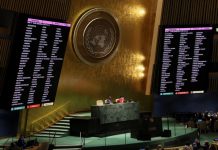Armenia and Azerbaijan agreed to a Russia-brokered ceasefire in Nagorno-Karabakh starting on Saturday after almost two weeks of fighting over the disputed region.
The foreign ministers of both the countries signed the truce in Moscow after the Russian president, Vladimir Putin, brokered a deal in a series of calls with president Ilham Aliyev of Azerbaijan and Armenia’s prime minister Nikol Pashinian.
However, there have been new reports of fighting between Armenia and Azerbaijan, just hours after the ceasefire came into force. The Armenian defence ministry accused Azerbaijan of shelling a settlement inside Armenia, while ethnic Armenian forces in Nagorno-Karabakh alleged that Azeri forces had launched a new offensive five minutes after the truce took hold.
A residential apartment block in Azerbaijan’s city of Ganja was destroyed overnight in what officials say was an Armenian missile strike. Officials say seven people were killed and dozens injured.
Armenia has called reports of the strike “an absolute lie”.
These accusations played out almost immediately after the ceasefire was agreed upon.
The Russian Foreign Ministry said in a readout that the ceasefire was called “for humanitarian purposes,” allowing for the exchange of prisoners and the bodies of the deceased. It added that the parameters of the agreement would be agreed on separately.
At a press conference in Baku on Saturday, Hikmet Hajiyev, an adviser to Azerbaijan’s President Ilham Aliyev accused Armenia of “violating” the agreed terms.
“Azerbaijan has no claims to the territory of any other state. The goal is to ensure our territorial integrity. If Armenia continues its provocations to violate the ceasefire, Azerbaijan must respond,” Hajiyev said.
The now-fragile ceasefire was to allow the two countries to exchange prisoners and recover bodies from the recent bout of fighting.
More than 300 people have died and thousands been displaced since the latest violence in the long-running conflict broke out on 27 September.
Earlier on Saturday, Russian Foreign Minister Sergey Lavrov said that The International Committee of the Red Cross would help make the truce work.
“The specific terms of the ceasefire still need to be agreed,” said Lavrov, who said the two rivals had also agreed to enter into what he called substantive peace talks to be held under the auspices of the Organization for Security and Cooperation in Europe’s (OSCE) Minsk Group.
Azeri President Ilham Aliyev, meanwhile, told Russia’s RBC news outlet that the warring parties were now engaged in trying to find a political settlement, but suggested there would be further fighting ahead.
“We’ll go to the very end and get what rightfully belongs to us,” he said.
Azerbaijan’s Foreign Minister Jeyhun Bayramov also said the “humanitarian ceasefire” would only last for as long as it took for the Red Cross to arrange the exchange of the dead.
Speaking at a briefing in Baku, he complained that the status quo on the ground in the mountainous region did not suit his country and that Azerbaijan hoped and expected to take control of more territory in time.
Armenia and Azerbaijan went to war over Nagorno-Karabakh in 1988-94, eventually declaring a ceasefire. However, they never reached a settlement in the dispute.









